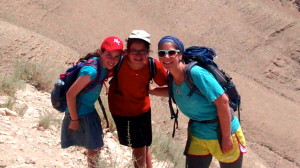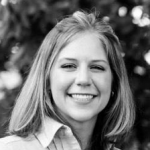Musings from Students of the Pardes Institute of Jewish Studies in Jerusalem
Posted on May 18, 2014 by Andrea Wiese
My dvar Torah from the Final 2013-14 Shabbaton:

On the Pardes tiyul with the daughters of two of my teachers. It’s such a blessing to be able to spend time with these families!
In Leviticus 26:42 (ויקרא כו:מב):
וְזָכַרְתִּי, אֶת-בְּרִיתִי יַעֲקוֹב; וְאַף אֶת-בְּרִיתִי יִצְחָק וְאַף אֶת-בְּרִיתִי אַבְרָהָםI will remember the brit of Yakov, even the brit of Yitzchak, and even the brit of Avraham.
 What I want to focus on here is that the text doesn’t just say Avot… it is clear that each forefather has his own brit with HaShem – the brit of Yakov, even the brit of Yitzchak, and even the brit of Avraham. I’m not going to go into the different britot, but it’s clear that they weren’t the same and because the avot were different and needed / wanted different things at certain times and places.
What I want to focus on here is that the text doesn’t just say Avot… it is clear that each forefather has his own brit with HaShem – the brit of Yakov, even the brit of Yitzchak, and even the brit of Avraham. I’m not going to go into the different britot, but it’s clear that they weren’t the same and because the avot were different and needed / wanted different things at certain times and places.
Another place that the Avot are listed similarly is in the Amida.

Here they are also listing them all separately. The God of Avraham, the God of Isaac and the God of Jacob. But why? We know that HaShem is God to all the Avot, so the statement itself is strange or maybe even unnecessary. It should say “the God of Abraham, Isaac, and Jacob,” But like in our Parsha, it doesn’t. It says “the God of Abraham, the God of Isaac, the God of Jacob.” Are they different gods?? No, of course not… Rav Bick who teaches at Yeshivat Har Etzion has an interesting observation:
“…the very concept of multiple avot implies that the religious and spiritual personality of each avot was uniquely different, and consequently, his relationship with HIS God was unique…there is no one single paradigm of a relationship with God.”
There isn’t just one way for us to have a relationship with HaShem. We all have individual relationships and interact with HaShem in our own way.
Rav Bick continued:
“We have a relationship with God because we are ‘children,’ successors, the heirs, (students) of the three forefathers. They taught us the path to God, they uncovered for us how to serve God.”
If this is true, that the Avot taught us the path to God, and uncovered for us how to serve God…
During my time at Pardes (3 years) I have come to feel that my teachers (and their spouses and families) have become my Avot. They have taught me how to have a relationship with HaShem and helped me discover how I want to live my Jewish life. Obviously I have more than three teachers at Pardes, and thus, more than three paradigms for how I want to practice my Judaism. And just as the Avot have different relationships with HaShem, I have witnessed their diverse relationships with HaShem as well. They each have their own way of teaching me, interacting with me, and of caring about me. They have guided me on my own personal path to mitzvot. They have been with me every step of the way as I have developed, deepened, and strengthened my own relationship with HaShem. Each teacher, while teaching the same Torah, the same words, has put their individualism, their passion, their love into their teaching and thus into me. This love is something that I can no longer separate from my Torah. Nor do I want to.

On the Pardes tiyul with the daughters of two of my teachers. It’s such a blessing to be able to spend time with these families!
My chevruta and I just read last week.
“Whoever teaches his son teaches not only his son but also his son’s son—and so on to the end of generations.”
– Talmud, Kiddushin, 30a
And since we’re Pardes, it can be daughters too.
But in all seriousness, I know that your love and Torah will be passed bez’h to many more generations. And just as our Avot were individuals, thank you for being individuals and thank you for teaching me as an individual.